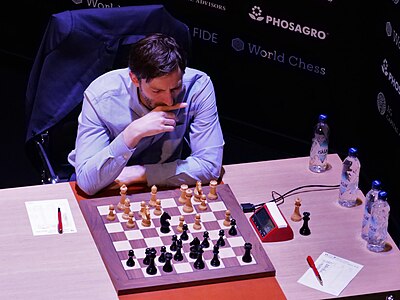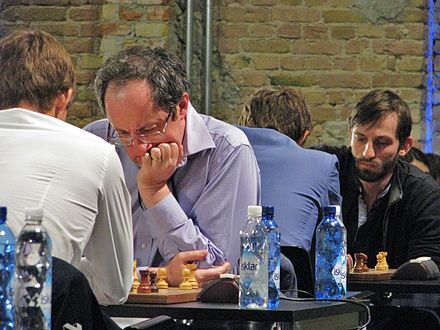Alexander Igorevich Grishchuk

|
|
| Grishchuk in Berlin 2015 |
|
| Surname | Alexander Igorevich Grishchuk |
| Association |
|
| Born | October 31, 1983 Moscow , USSR |
| title |
International Master (1998) Grand Master (2000) |
| Current Elo rating | 2777 (August 2020) |
| Best Elo rating | 2810 (Dec. 2014 - Feb. 2015) |
| Tab at the FIDE (English) | |
Alexander Igorewitsch Grishschuk ( Russian Александр Игоревич Грищук , scientific transliteration Aleksandr Igorevič Griščuk ; one often meets the English form Grischuk ; born October 31, 1983 in Moscow ) is a Russian chess grandmaster .
Career
Grishchuk comes from a family of intellectuals, his parents are physicists. His chess talent was strongly promoted in the 90s. In 1992 he took part in the U10 youth world championship in Duisburg, where he was runner-up behind Luke McShane . As a child he continued to play in important national and international youth tournaments (such as in 1995 in Verdun at the European Youth Championships U12, in which he took sixth place), but also increasingly in tournaments for adults. As early as 1998 he took part in the championship of Russia among adults. His 5 points from 11 games were already a respectable result.
In 1999 he achieved the first excellent results: He won the Chigorin Memorial in Saint Petersburg and was nominated for the Russian national team, for which he took part in the European Team Championship in Batumi (+3 = 6 −0). In 2000, at the age of 16, FIDE awarded him the title of Grand Master . Further successes followed in the same year, he won together with Ruslan Ponomarjow in Tórshavn and reached the semifinals at the FIDE World Cup in New Delhi , where he was defeated by Alexei Schirow . At the Chess Olympiad in Istanbul he played solidly and successfully again: (+5 = 5 −0). Grishchuk studied at the Moscow Sports University.
His success at the FIDE World Championships made him one of the elite players: he took part in Linares in 2001, where he finished second ( Garry Kasparov won ). In 2002 he was second in Wijk aan Zee behind Yevgeny Bareev and shared first at the Aeroflot Open in Moscow . At the Rapid Chess Grand Prix in Dubai in 2002 he was second behind Péter Lékó , who he lost in the final. In 2004 he won the elite tournament in Poikowski together with Sergei Rublewski . At the FIDE World Championships in Tripoli in the same year he made it to the quarter-finals, where he lost in the fast games against the eventual world champion Rustam Kasimjanov . In the same year he was behind Garri Kasparow Russian runner-up in Moscow. In September 2006, Grishchuk won the FIDE World Championship in blitz chess in Rishon leTzion after a playoff against Pyotr Swidler . At the candidates tournament from May 26 to June 13, 2007 in Elista , Grishchuk qualified for the tournament for the world championship by winning competitions against Vladimir Malachov (3.5: 1.5) and Sergei Rublewski (5.5: 3.5 after a playoff) in September 2007, in which he did not get past eighth and thus last place. In August 2007 he won the strong blitz chess championship in Moscow with 17 points from 19 games. In March 2009, he won the elite tournament in Linares with 8 points from 14 games after evaluation before Wassyl Ivanchuk tied on points . In December 2009 he won the final of the Russian Championship in Moscow with 6.5 points from 9 games.

In 2011 he made it to the finals of both the Candidates' Tournament and the Chess World Cup and came in second. In 2012 he became world champion in blitz chess for the second time after 2006 in Astana . At the world championship in rapid chess, which was held for the first time, he came in 5th place.
At the Rapid and Blitz Chess World Championships 2015 in Berlin , Grishchuk became world champion blitz chess for the third time. In classical chess he came second at the FIDE Grand Prix 2017 and thus qualified for the candidates tournament of the 2018 World Cup in Berlin, where he finished sixth. He won the following FIDE Grand Prix in 2019 and thus qualified for the candidates' tournament of the 2020 World Cup in Yekaterinburg.
Grishchuk is one of the critics of the classic cooling off rule in chess. According to his own statement, he can only motivate himself for such tournaments when it comes to high stakes, otherwise he prefers blitz and rapid chess.
He is married to Jekaterina Lagno and has four children.
Grishchuk was known as a passionate and semi-professional poker player who participated in both live tournaments and played online . In 2017, however, he announced that he had given up playing poker.
 |
National team
Grishchuk has been a member of the Russian national team since 1999 and has participated in eight chess Olympiads, six team world championships and six team European championships. He was Olympic champion in 2000 and 2002, team world champion in 2005, 2010 and 2013 and European team champion in 2003, 2007 and 2015.
societies
In the Russian team championship , Grishchuk played for Norilski Nikel Norilsk in 2001 , from 2003 to 2009 for the Ural Yekaterinburg team , with which he was team champion in 2006 and 2008, in 2010 for Khanty-Mansiysk and in 2013 and 2014 for Malachit Oblast Sverdlovsk , which was champion in 2014. In the German federal chess league, Grishchuk played in the 2002/03 season with the master Lübeck chess club from 1873 , and in the 2016/17 season he played in the 2nd Bundesliga with the SF Deizisau . In France he played for Paris NAO until 2006 , with whom he became champions in 2003 , 2004 , 2005 and 2006 , and in Spain in 2007 for CA Intel-Tiendas UPI Mancha Real . He won the European Club Cup in 2001 with Norilski Nikel Norilsk , in 2003 and 2004 with Paris NAO , in 2008 with Ural Yekaterinburg and in 2012 with SOCAR Baku . With Shanghai Mobile China , Grishchuk won the Chinese team championship in 2017 and 2019 .
Game example
| a | b | c | d | e | f | G | H | ||
| 8th | 8th | ||||||||
| 7th | 7th | ||||||||
| 6th | 6th | ||||||||
| 5 | 5 | ||||||||
| 4th | 4th | ||||||||
| 3 | 3 | ||||||||
| 2 | 2 | ||||||||
| 1 | 1 | ||||||||
| a | b | c | d | e | f | G | H |
In the following game, Grishchuk won with the black stones against Magnus Carlsen at the Sinquefield Cup in St. Louis 2015.
- Carlsen – Grishchuk 0-1
- St. Louis, August 30, 2015
- Sicilian Defense ( Najdorf Variation ), B92
- 1. e4 c5 2. Nf3 d6 3. d4 cxd4 4. Nxd4 Nf6 5. Nc3 a6 6. Be2 e5 7. Nb3 Be7 8. Be3 Be6 9. Qd3 Nbd7 10. Nd5 0–0 11. 0–0 Bxd5 12. exd5 Rc8 13.c4 Ne8 14.Qd2 b6 15.Rac1 a5 16.Na1 g6 17.b4 Ng7 18.bxa5 bxa5 19.Bd3 Nc5 20.Bc2 a4 21.Rb1 e4 22.Bxc5 Rxc5 23.Bxa4 Rxc4 24.Bc6 Nf5 25. De2 Rc3 26. Qxe4 Ra3 27. De2 Bf6 28. Nb3 De7 29. Qxe7 Nxe7 30. Nd2 Rxa2 31. Nc4 Rd8 32.g4 Bd4 33.Rbd1 Bc5 34.Rd2 Rxd2 35. Nxd2 Nxc6 36. dxc6 Rc8 37. Ne4 Rxc6 38. Rd1 h6 39. h4 Kf8 40. Kg2 Ke7 41. Rc1 Rc8 42. Kf3 Ke6 43. Rc2 Rc7 44. h5 gxh5 45. gxh5 Bb6 46. Re2 Bd4 47. Kg3 d5 48. Nd2 + Kf5 49. Kg2 Be5 50.Nf3 Bf6 51.Ra2 Rd7 52. Ne1 Rc7 53.Kf3 Bg5 54.Ra5 Ke5 55.Ke2 Ke4 56.Ra4 + d4 57. f3 + Kd5 58.Ra5 + Kc4 59.Nd3 Re7 + 60.Re5 Re6 61. f4 Bf6 62. Rxe6 fxe6 63.Nf2 Be7 64.Ng4 Kc3 65. f5 exf5 66.Nxh6 Kc2 0: 1
literature
- "I get bored very quickly". In: New In Chess . Volume 6, 2007, pp. 20-23. (Interview with Dirk Jan ten Geuzendam)
Web links
- Alexander Igorewitsch Grishchuk at the World Chess Federation FIDE (English)
- Replayable chess games by Alexander Igorewitsch Grishchuk on chessgames.com (English)
- Interview at ChessCafe ( Memento from September 27, 2007 in the Internet Archive ) (English; PDF file; 212 kB)
- Alexander Grischuk, a very good picture poker player
Individual evidence
- ^ André Schulz : A new chess couple. In: ChessBase. September 12, 2019, accessed September 18, 2019 .
- ↑ Ulrich Stock: Candidates tournament: woe, you have to. Zeit.de, March 14, 2018, accessed December 11, 2019 .
- ↑ Colin McGourty: Alexander Grischuk: Chess is “just a game” (interview). chess24.com, April 7, 2017, accessed December 11, 2019 .
- ↑ Numbers according to FIDE Elo lists. Data sources: fide.com (period since 2001), olimpbase.org (period 1971 to 2001)
- ↑ a b Alexander Grishchuk's results at the Chess Olympiads on olimpbase.org (English)
- ↑ a b Alexander Grishchuk's results at team world championships on olimpbase.org (English)
- ↑ a b Alexander Grishchuk's results at European team championships on olimpbase.org (English)
- ↑ Alexander Grishchuk's results at Russian team championships on olimpbase.org (English)
- ↑ Alexander Grishchuk's results at Spanish team championships on olimpbase.org (English)
- ↑ Alexander Grishchuk's results at European Club Cups on olimpbase.org (English)
| personal data | |
|---|---|
| SURNAME | Grishchuk, Alexander Igorevich |
| ALTERNATIVE NAMES | Grischuk, Alexander; Грищук, Александр Игоревич (Russian); Griščuk, Aleksandr Igorevič |
| BRIEF DESCRIPTION | Russian chess player |
| DATE OF BIRTH | October 31, 1983 |
| PLACE OF BIRTH | Moscow |

